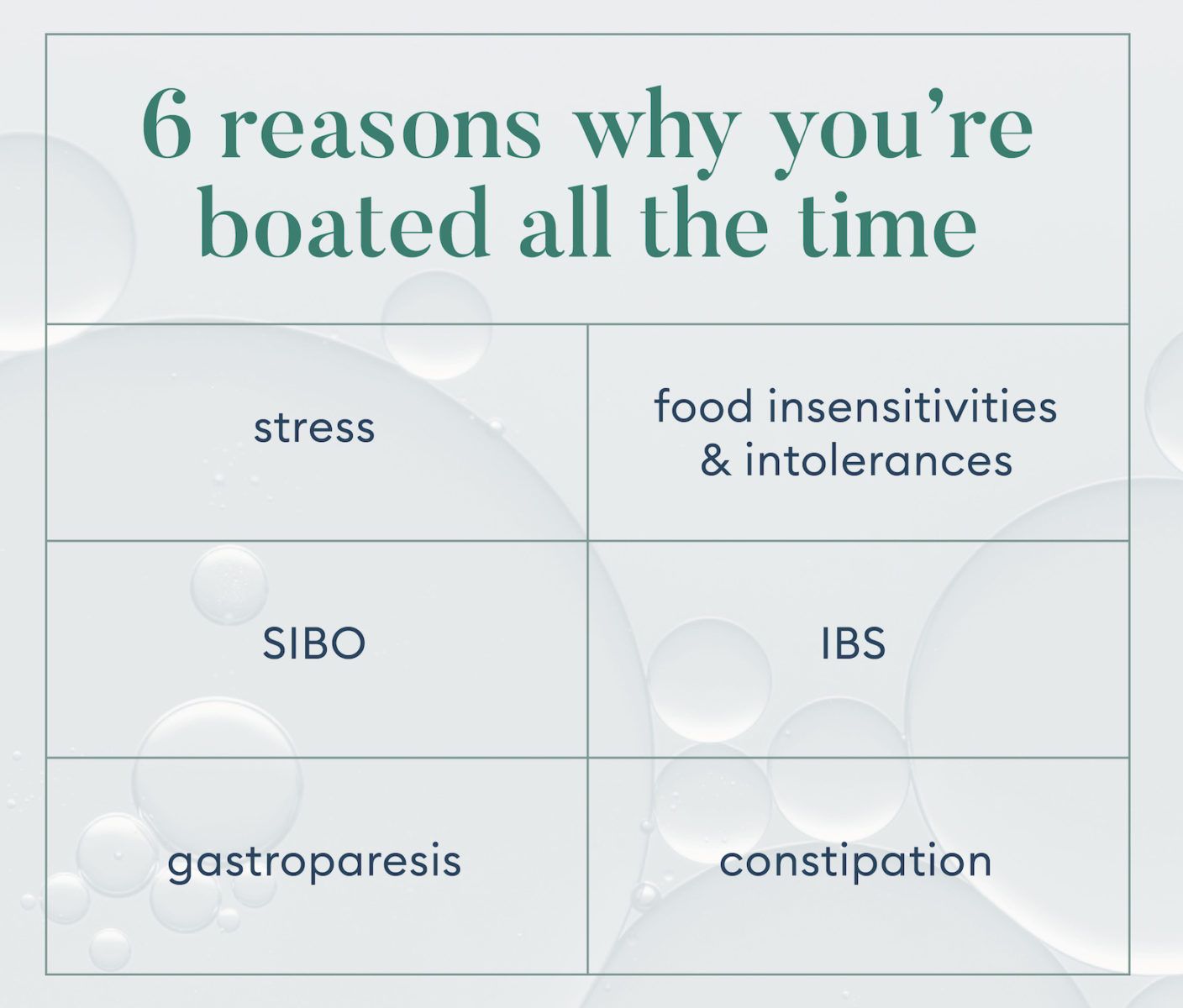Most of us feel bloated from time to time. But if you've been asking yourself, "why am I always bloated?", there may be a bigger issue at play. Here are several reasons you may feel bloated 24/7.
How much bloating is normal?
Bloating is one of the most commonly reported gastrointestinal (GI) complaints, according to research published in the journal Gastroenterology & Hepatology. But while bloating is common, only a certain amount is considered normal, or healthy.
“If you eat a huge meal and you’re a little bit bloated and gassy, that’s normal,” says Cori Cohen, RD, a former dietitian and health coach at Parsley Health. You may also feel unusually full and tight if you scarf your food down quickly, as this may bring excess air into your stomach. “But if you’re experiencing it with almost anything you eat, and it’s hard to identify food triggers, that is a red flag,” Cohen says. “If you have been experiencing bloat and discomfort for a prolonged period (as in over a year) and/or you’ve had lifelong digestive issues, that’s when it’s time to dig deeper for root causes,” she adds.
Bloating often merits medical attention. When accompanied by certain symptoms, bloating deserves urgent medical attention. These symptoms include:
Sudden weight loss
Blood in stool
Yellowing of the skin
What is bloating?
Okay, so you know what bloating feels like—an uncomfortable, sometimes painfully full belly—but do you know what it is? Well, bloating is a condition caused by excess air or gas that’s stuck somewhere in the digestive tract. “Bloating can be trapped gas in the large intestine, or it can be an overgrowth of bacteria in your small intestine that’s fermenting the food you’re eating and causing that bloat,” Cohen says. Then, your body eases that bloating by releasing the extra gas or air (i.e., belching and farting).

Common causes of excessive bloating—and what to do about it
If you’re bothered by constant bloat, any of the following conditions could be to blame. But don’t worry, every cause has a solution.
1. Stress
If your persistent bloat is a new issue (under 6 months), stress may be to blame, Cohen says. Eating while stressed or in a rush can make it hard to digest your food, leading to that uncomfortable bloated feeling. That’s because when you’re stressed, your body is in fight-or-flight mode (i.e. your sympathetic nervous system is activated,) which includes slowing down or even stopping digestion so your body can handle the perceived threat.
Your plan:
Cohen suggests keeping a wellness journal for a couple of weeks so you can keep tabs on stress levels and symptoms. She often recommends the Cara Care digestive health app to her clients, because it allows you to track food, stress levels, and symptoms to identify what might be causing your bloat.
If you discover stress is a trigger for your bloating, start by taking a few deep belly breaths before you eat. “Taking three to five deep belly breaths before you eat can help calm the nervous system, so you’re not in that fight-or-flight mode while you’re eating,” Cohen says.
To do it, place your hands over your belly and take a deep breath in through your nostrils. As you inhale, you should feel your belly push against your hands. Then, as you exhale, pull your belly in toward your spine. Do that three to five times and you should feel more relaxed going into your meal, Cohen says. Keep that relaxed feeling going by putting your phone and computer away for the entire meal. This puts your body into rest-and-digest mode, when intestinal activity increases.
2. Food sensitivities and intolerances
Some people just have a hard time digesting certain foods, like gluten, dairy, or even raw vegetables. So, before diagnosing a more serious problem, Cohen will have patients start by eliminating common culprits like added sugars, gluten, and dairy to find out if food sensitivities may be the real issue. “That kind of clears the muddy waters,” Cohen says. Then, if you’re still having issues after removing those foods, common sources of inflammation, your doctor may start testing for other causes, like SIBO or imbalances in the large intestine.
Your plan:
If you want to try an elimination diet, work with a doctor, health coach, or registered dietitian. They can guide you through a personalized program and help you identify the foods that may be exacerbating digestive issues. They’ll also be able to answer questions you have along the way and hold you accountable.
3. SIBO
Also known as small intestinal bacterial overgrowth, SIBO is characterized by excess bacteria in the small intestine. When food makes its way into the small intestine, the excess bacteria eats it away, creating a surplus of hydrogen and methane gases. The gases eventually build up in the intestines, leading to the dreaded bloat. “[SIBO] isn’t usually the first cause for bloating that we jump to at Parsley Health,” Cohen says, but if you’ve been experiencing bloating for years and have ruled out specific food intolerances, SIBO could be the answer.
Your plan:
Your doctor may diagnose SIBO by performing a breath test to measure the levels of methane and hydrogen in your body. If you do have SIBO, your doc will put you on a treatment plan. At Parsley Health, the treatment plan varies depending on the severity of the case and may include antibiotics, herbal antimicrobial and gut healing supplements, and motility agents, in combination with specific dietary strategies and lifestyle considerations.
4. Dysbiosis
Bloating is a common symptom of dysbiosis, or an imbalanced gut microbiome. Things like a diet high in sugar, processed foods, a lack of sleep, and limited physical activity have been directly linked to promoting imbalance and a lack of diversity in gut bacteria, which can lend way to digestive distress. The naturally occurring microorganisms in your GI tract can also easily become unbalanced from antibiotic use or food poisoning. If you have other digestive issues in addition to bloating, like diarrhea, gas, or constipation, Parsley Health doctors might recommend a gut microbiome test to determine what types and amounts of certain bacteria you have, helping them tailor a plan for you.
Your plan:
If you do have dysbiosis, you may be able to keep symptoms at bay by managing stress, adjusting to an anti-inflammatory diet, and implementing other gut healing strategies such as therapeutic foods and supplements . You can work with a Parsley Health doctor and health coach to find the right combination of lifestyle changes to resolve bloating and get to the root cause of your symptoms, as it may look different for everyone.
5. Gastroparesis
Gastroparesis is a condition in which the stomach can’t empty food at a normal pace, and bloating is a common symptom. “It’s most common in those with poorly managed diabetes, connective tissue disorders like scleroderma, autoimmune conditions, eating disorders, or those who have undergone surgery of the upper intestinal tract resulting in vagal nerve damage,” says Cohen. If your doctor suspects you may have gastroparesis, they may give you a blood sugar test, as well as refer you to a G.I. specialist for a gastric emptying test to see how long it takes food to move through your stomach.
Your plan:
As with most other common causes of bloating, you may be able to ease your symptoms by making lifestyle changes. Namely, prioritizing foods that are easier to digest, like low-fat foods, soups and pureed foods, and well-cooked fruits and vegetables.
6. Constipation
When you’re constipated, stool sits in your colon longer than usual, giving bacteria more time to ferment what’s in there, according to Johns Hopkins. The result? Excess gas and bloating. Chronic constipation may also be linked to another condition, such as SIBO or hypothyroidism, notes Cohen.
Your plan:
If you’re frequently constipated and bloated, lifestyle changes like increasing daily movement, drinking more fluids (like water and herbal tea), and upping fiber intake can make a big impact, says Cohen.
Takeaways
Bloating has many potential causes, many of which can be resolved or managed with lifestyle changes. Working with a supportive holistic health team can also help diagnose and treat the underlying cause. If searching for that team, contact Parsley Health today.


